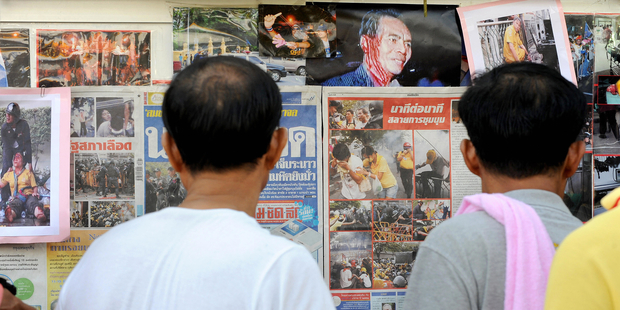Thailand’s military authorities must halt the alarming deterioration in respect for freedom of expression and peaceful assembly, including ending the unprecedented use of the lèse-majesté law, Amnesty International said ahead of International Human Rights Day on 10 December.
“We are seeing a spiral into silence in Thailand – ongoing, harsh restrictions that are stifling free speech and suffocating a once vibrant civil society,” said Richard Bennett, Amnesty International’s Asia-Pacific Director.
“Denying the space for debate and jailing peaceful critics through the repressive lèse-majesté law will do nothing for the ‘national reconciliation’ that the authorities have promised.”
Official sensitivity to perceived criticism is high. Censorship spans from controls on academic seminars to the media – authorities are regularly calling in editors and in recent weeks have threatened them with prosecution should they infringe restrictions on what they can report.
Gatherings of more than five people remain banned. Nineteen peaceful protesters have been detained in the past month for flashing the so-called ”Hunger Games salute” and another eight for distributing leaflets.
“International Human Rights Day is an opportunity for people around the world to celebrate the progress that has been made in realizing human rights – unfortunately, Thailand has little to celebrate this year,” said Richard Bennett.
“Full human rights guarantees – including on freedom of expression and peaceful assembly – should be reinstated in the Constitution and respected in practice.”
Lèse-majesté law
Since the military seized power on 22 May this year, at least 24 individuals have been arrested for allegedly violating Article 112 of the Criminal Code – the lèse-majesté law, which bans criticism of royal family.
Arrests have rocketed over the past weeks. At least 12 individuals have been arrested on lèse-majesté charges over the past month, and police say dozens more may be arrested and charged before the end of the year.
“The abuse of the justice system and unrelenting use of repressive legislation – including the lèse-majesté law – to silence any perceived dissent must end immediately,” said Richard Bennett.
“The vaguely worded lèse-majesté law criminalizes the peaceful expression of opinions and violates the right to freedom of expression, which Thailand is obliged to respect under international law. It should be suspended immediately and revised to bring it in line with Thailand’s human rights commitments.”
Those arrested under the law face closed-door trials in military courts where observers have been banned and there is no right to appeal – clear violations of the right to a fair trial.
In the most recent lèse-majesté conviction – believed to be the eighth since the coup – Prasit Chaisrisa, a former Pheu Thai MP, was sentenced on 3 December to five years, reduced to 30 months in prison for a speech deemed insulting to the King.
In another recent case, on 8 December, authorities reportedly summoned a woman in the north-east for interrogation after she posted a picture of herself and friends wearing black on the King’s birthday, 5 December.
Lèse-majesté suspects are also routinely denied bail, on the pretext that their cases are matters of “national security”. Since his arrest in 2011, magazine editor Somyot Prueksakasemsuk, convicted on lèse-majesté charges in January 2013, has been denied 16 separate bail requests, including during his appeal.
“Amnesty International considers all those who have been jailed solely for peacefully expressing their opinions to be prisoners of conscience, who should be released immediately and unconditionally,” said Richard Bennett.


